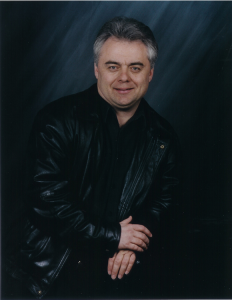Musician Writes Songs for Soldiers of the Past
By Lookout on Mar 23, 2015 with Comments 0

Michael Moore, a Canadian songwriter, musician, and teacher based in Toronto.
“I’ve thought about what happened at Dieppe for a long time,” says Michael Moore, a Canadian songwriter, musician, and teacher based in Toronto.
“The fact that 6,000 soldiers, when they were crossing, had no idea what was coming, and how the Germans were entrenched in the shore ahead of them. They didn’t know what was about to happen.”
For Moore, 6,000 is a precious number.
His most recent song, “6,000 Soldiers” refers to the number of allied forces that fought at Dieppe on Aug. 19, 1942.
The 5,000 Canadian troops, 1,000 British Commandos, and 50 American rangers that fought the battle are honored in the lyrics of the song, recorded in February of this year in Nashville, and released on YouTube the morning of March 10.
Moore has been a musician since he was in seventh grade, where he began playing the trumpet in band class.
He continued to play throughout high school and his post-secondary education, eventually graduating from the University of Toronto with a degree in music.
Though he was trained as a trumpet player, he plays the keyboard and a range of other band instruments.
Moore, however, prefers crafting songs to performing on stage.
“I mostly like to write,” he says.
“I do perform at smaller venues occasionally, but it’s the writing I really enjoy. I’m quite happy to let others do the singing.”
Lead vocalist William Ray’s soulful voice helps give the song a country feel, fitting with Moore’s preferred music genre, a blend of folk and country.
Moore was raised in Petawawa, Ontario, home to the Garrison Petawawa base. Though he didn’t grow up in the military community, he says he’s always had an interest in Canadian history, and in particular, the wars that Canada has fought.
As a music and history teacher, Moore says he emphasizes the importance of the Dieppe battle in his classes.
He is always surprised by the number of people who have never heard of Dieppe, and hopes that his song will bring about awareness as to what happened that day.
“I just have a keen sense that younger people need to be more aware of Canada’s role in some of these events, the blood that we have spilled, and the contributions we have made.”
Though he wrote the song, in part, to reach younger audiences who are less aware of Canada’s history, Moore also wrote the song for veterans, and for those whose relatives saw action at Dieppe.
“I think, really, that I wrote the song for all Canadians,” he says. “I remember hearing a quote one day that said: ‘this country is thirsting for songs about its identity,’ and I thought about that when I wrote this.”
Numerous listeners have reached out to Moore to thank him personally for his work, including a brother and sister who had a relative die during the Battle at Dieppe.
What really touches him about the Dieppe battle is the utter shock the Allies faced that day.
“It was the element of being surprised – how the Canadians and the British and the Americans were surprised – that strikes me most. They walked into something completely unexpected – 907 Canadians died, 586 were wounded and almost 2,000 were captured. It was a Canadian military tragedy.”
His sentiment is reflected in his favorite lyrics: “At 5 a.m. we landed, and then the fire and mortar rained down.”
“Those lyrics are where the rubber hits the road for me. They encompass exactly what happened,” he says.
He says the song-writing process was especially slow.
He completed in-depth research on the experience of the soldiers in order to accurately capture their emotions and the emotions of their loved ones.
Then, he poured that feeling into the crafting of his lyrics.
He put his pencil to paper in September 2014, working on and off throughout December to polish the song, finally sending it to the studio in January.
Another song of Moore’s, “Forever You’ll Be”, honours the Canadian soldiers at rest in the Holten Canadian War Cemetery in Holland, and was recently granted permission to be used in the 70th liberation ceremonies held at the cemetery in May.
To hear Moore’s music, visit
www.michaeljmooresongwriter.com
Rachel Lallouz
Staff Writer
Filed Under: Top Stories
About the Author:





